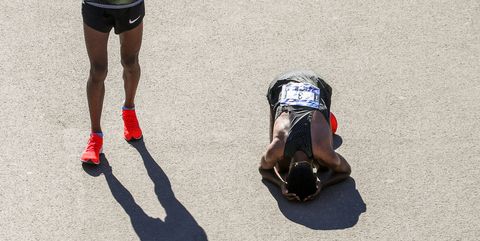
[ad_1]
Lelisa Desisa started with cool judgment, held on with stern resolve, and finished with blazing passion to win the New York City Marathon today. The Ethiopian’s 2:05:59 is the second fastest time in the race’s 48 years. His training partner and protégé, Shura Kitata, chased him to the last drop of willpower up the draining final incline to Tavern on the Green, and will follow Desisa in the record book, as the third fastest ever on this demanding course, 2:06:01.
Advertisement – Continue Reading Below
Both disappeared after the finish into a gleeful three-man hug with their coach, Haji Adillo Roma. They had plenty to celebrate. It was Ethiopia Strikes Back, a dramatic riposte against what until today seemed total Kenyan dominance of the world men’s marathon in 2018.
Everyone read this race wrong, except Desisa. Prerace, Geoffrey Kamworor of Kenya was universally the hot favorite. He was the defending champion, possessed of stellar track and road times, close friend of the godlike world-record holder Eliud Kipchoge, whom he has recently matched in training. Through 24 miles, moving smoothly, he appeared to have things under control, just as we all expected.
We were wrong. While Kamworor was leading the anxious-looking Desisa through Central Park with three miles to go, he seemed to be holding the pressure, waiting for his moment to break the chain. In cold stats reality, in mile 24 Kamworor slowed to 4:45, after running 4:29 for mile 23. He was hurting. It was Desisa who chose the moment. Near mile 25, as we waited for Kamworor to thrust in the sword, Desisa looked ahead, tossed away his woolen hat, and threw in the fierce surge that seized the race.
Advertisement – Continue Reading Below
Desisa knew what he wanted, and only he believed possible. He has twice won the Boston Marathon, and is beloved there for returning his 2013 medal to the city as a gesture of support after the bombings that year. But in five attempts at New York, he has always been the gallant loser, three times standing on the podium, without a victory. He neatly summed up his New York history after the race, in willing but less than perfect English.
“I think this year to be champion,” he said. “In New York, I am number 2, number 3, one year I did not finish, again number 3. This year I decide to be the champion. I am tired for champion here. This is my dream.”
While Desisa has been winning marathons since 2013, Kitata is the rising force. He hit the headlines in April as the surprise challenger and runner-up to Kipchoge in London in a personal best of 2:04:49, burned a fast solo 59:16 half marathon in Philadelphia in September, and started out today with youthful confidence and aggression. Perhaps youthful folly. It’s not often that anyone risks putting a gap on a world-class field up the quite steep first mile on the Verrazzano-Narrows Bridge.
Advertisement – Continue Reading Below
Advertisement – Continue Reading Below
“I did everything my coach told me,” Kitata said through an interpreter. “I was extremely confident of a fast time, so I was happy to lead the race. Later I felt that effort in my legs, so dropped behind Lelisa and Geoffrey. But when my legs felt better, I was confident I could be second.”
Kamworor had no response, though he has the consolation that his 2:06:26 for third is the fourth-fastest New York time ever, and four minutes faster than his winning time in 2017. At the postrace media conference, Kamworor looked more disappointed than he was willing to admit.
“I am happy. I gave out the best I could,” he said. But he will need a bit more of the Kipchoge magic if he is to emulate his mentor.
Or perhaps Kamworor was simply outsmarted by a well-drilled team. The early miles were a display of collaborative running by the Ethiopians. At three miles, they had the first four places. Kitata was usually out front by about 30 yards, arms pumping, smiling cheerfully, sometimes even seeming to interact with Ethiopian spectators. Training buddies Desisa and Tamirat Tola sometimes moved alongside, most often when Kitata slowed at drink tables, exchanging hand signals. All are coached in Addis Ababa by Roma, who told Runner’s World before the race “they are all well prepared.”
Desisa described how carefully they ran their accelerating race.
Advertisement – Continue Reading Below
“We ran halfway on pace for 2:06-plus. Then we increase after halfway, especially after 35K,” Desisa said. The “we” is significant. Kamworor had no Kenyan company, once former London champion Daniel Wanjiru drifted back at halfway, and then the little-known Festus Talam just before 20 miles.
The Ethiopia/Kenya rivalry in major marathons is unofficial and usually unnoticed, but when Desisa won Boston in 2013 and 2015, the way he worked with his compatriots shaped both races. This time it looked as if Kitata, 22, was the star, and the older Desisa, 28, was there to support and protect him.
Wrong again. When Kamworor first attacked at 22 miles, it was Desisa who moved right with him, and Kitata who drifted. In the last 800 meters, when the resurgent Kitata swept past Kamworor into second, and closed within strides of Desisa, it took one glance for Desisa to dig even deeper and drive himself to the tape, two seconds clear. It was the closest men’s finish at New York since 2005.
“At 800 to go, I saw him. I know him. We train together. He is a young and strong guy. I am afraid of him. But this is my dream,” Desisa said.
Desisa won $100,000 for the victory, plus a $45,000 bonus for going sub-2:06.
Source link
